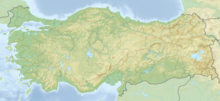Alabanda
Coordinates: 37 ° 35 ′ 30.5 ″ N , 27 ° 59 ′ 7.5 ″ E
Alabanda ( ancient Greek Ἀλάβανδα ; also known as "Carian Antioch") was an ancient city in Caria , Asia Minor , near today's Doğanyurt (also called Araphisar) in the Turkish province of Aydın .
The city is located between two hills, the area is known for its dark marble. According to Stephanos of Byzantium , there were two Carian cities called Alabanda, but no other ancient source confirms this. According to ancient mythology, the city was founded by the local Carian hero Alabandos . In the early days of the Seleucid period , Alabanda was part of the Chrysaori League, a loose association of Carian cities, including Alinda , Mylasa and Stratonikeia , which was primarily supposed to coordinate common trade, but also defense tasks. In honor of Antiochus III. Alabanda, which ensured peace in the city, was renamed Antioch. 201 BC The city was conquered by Philip V of Macedonia . After the Seleucids at the Battle of Magnesia in 190 BC. Were defeated by the Romans under Lucius Cornelius Scipio Asiaticus , Alabanda got its old name back. Soon after, the Romans conquered the city. Quintus Labienus took in 40 BC. The city at the head of a Parthian troop. After the residents had massacred the occupation, the Parthians confiscated all treasures and possessions. During the Roman Empire , Alabanda was the seat of a convent, according to Pliny, and Strabo mentions the high standard of living and the decadence of the city's inhabitants. The city minted its own coins until the middle of the 3rd century AD. In Byzantine times, the city received a bishopric, the occupation of which can be traced back to sources from 451 to 879. The speakers Menekles and Hierocles should be mentioned among famous residents of the city . The ruins of the city lie west of Çine and include a theater , a temple , a buleuterion and other buildings , among others . A few inscriptions have come to light through excavations.
Type locality
Alabanda is a type locality for the garnet mineral almandine , which was also named after this place. The manganese mineral alabandin , which is similar by name , was also named after this place, but the location has not yet been confirmed.
literature
- George Ewart Bean : Alabanda (Araphisar) Caria, Turkey . In: Richard Stillwell et al. a. (Ed.): The Princeton Encyclopedia of Classical Sites. Princeton University Press, Princeton NJ 1976, ISBN 0-691-03542-3 .
- Gustav Hirschfeld : Alabanda . In: Paulys Realencyclopadie der classischen Antiquity Science (RE). Volume I, 1, Stuttgart 1893, Col. 1270.
- Hans Lauter : The architecture of Hellenism . Wissenschaftliche Buchgesellschaft, Darmstadt 1986, ISBN 3-534-09401-8 , pp. 165, 186.
- Wolfgang Müller-Wiener : Greek construction in antiquity . CH Beck, Munich 1988, ISBN 3-406-32993-4 , p. 128.
- Frank Rumscheid : Investigations into building ornamentation in Asia Minor . Zabern, Mainz 1994, ISBN 3-8053-1549-X , Vol. I, p. 141 ff.


